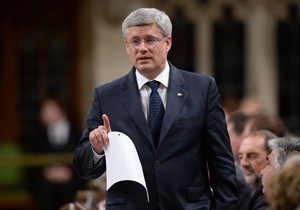
Prime Minister Stephen Harper answers a question in the House of Commons, Tuesday, Sept. 16, 2014 in Ottawa. THE CANADIAN PRESS/Sean Kilpatrick
Republished September 16, 2014 - 3:38 PM
Original Publication Date September 16, 2014 - 12:20 PM
OTTAWA - The phrase "boots on the ground" is a well-worn stand-in for "war" — a word nobody wanted to use Tuesday as MPs gathered for an emergency debate on the decision to join the fight against militants in the Middle East.
At the centre of the debate is the question of whether sending highly trained, heavily armed special forces commandos into northern Iraq is a "combat operation" — a distinction that would require Parliament's approval.
Nonetheless, no vote or consensus will emerge from the House of Commons debate, which was granted Monday by Speaker Andrew Scheer following a request by Liberal MP Marc Garneau.
Prime Minister Stephen Harper has repeatedly said he would not "put boots on the ground" in Iraq, meaning a broader deployment of regular force soldiers would not follow the arrival of Canadian special forces.
Many of Harper's critics are having trouble distinguishing the two.
The Opposition NDP and the Liberals both fear Canada's advise-and-assist mission with Iraqi forces and Kurdish fighters could turn into combat, much as the "peacekeeping deployment" of a battle group to Kandahar did in 2006.
The U.S. is "gearing up" — to use Harper's words in the Commons on Tuesday — for an extended "counter-terrorism operation" against the fearsome al-Qaida splinter group known as the Islamic State of Iraq and the Levant, or ISIL.
Experts say a prolonged struggle against ISIL could well come to involve the use of western troops in a limited fashion, regardless of current political assurances.
Influential strategists who advocated for U.S. troop surges in both Iraq and Afghanistan said Monday that up to 35,000 western "boots" might be needed to degrade and destroy the group.
On Tuesday, Harper confirmed that 69 special forces operators would take part in the Iraq deployment, which will be reviewed within 30 days.
But a counter-terrorism operation is not simply giving advice to local forces — or teaching them how to co-ordinate airstrikes. It is a systematic campaign that targets a terror group's funding, infrastructure and leadership.
To date, Canada has apparently not deployed its elite counter-terrorism unit, Joint Task Force 2, to take part. "Apparently," because Conservative and Liberal governments alike don't acknowledge JTF 2's top-secret activities.
Word of the unit's activity in Afghanistan in the wake of the U.S. terror attacks on Sept. 11, 2001, emerged by way of a newspaper photograph, touching off a scandal that eventually cost then-defence minister Art Eggleton his job.
If the Harper government did opt to participate fully in the U.S. campaign, it would likely be JTF 2 members involved in hunting ISIL leaders — and neither the government nor the military would want that debated in Parliament.
Holding a vote on combat deployments is something the Conservatives have long championed, notably in the two extensions of Canada's combat mission in Kandahar and the Libya bombing campaign.
NDP Leader Tom Mulcair has tried to cast Harper as flip-flopping by pointing out that he pledged in 2007 to hold votes on "all" troop deployments.
But no vote was held on the Afghan training mission, even though it contained a certain degree of risk and saw one soldier killed, said University of Ottawa defence expert Philippe Legasse.
The law doesn't require the government to consult with MPs when it puts troops in harm's way. The opposition should be careful what it wishes for because a vote tends to stifle subsequent debate, especially in a long conflict, Legasse added.
"The effect of having a vote is a point of finality in a way because it allows the government to say this issue has been settled, the Commons has voted with us, and therefore we're following the democratic will of the Commons," he said.
"The executive can simply say, 'Let's move on,' even if the opposition has voted against them."
If the opposition really wants to do its job, it would be on its feet every day asking questions about the deployment, he added.
"The Commons' job isn't to pretend it's there to make decisions," Legasse said. "The Commons' job is to hold to account those that have the responsibility for making the decisions."
If the government was smart, he said, it would be upfront if and when JTF 2 becomes involved.
"The prime minister and the defence minister should get up, declare what they're doing, explain why they can't give more details than they're giving and explain the rationale behind it," Legasse said.
"You can do that without getting into any secret information."
Follow @Murray_Brewster on Twitter
News from © The Canadian Press, 2014